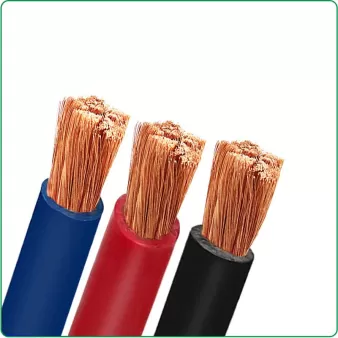- Home
- Products
- Certificates
- Cooperation
- About Us
- News
- Contact
Contact
+86 188 3213 4509
Contact
+86 188 3213 4509
Sep. 04, 2025
Electrical cables are the lifeline of every power system, but not all cables are built to withstand the harsh conditions of outdoor environments. Sunlight, rain, wind, temperature extremes, and physical stress can degrade ordinary cables, leading to short circuits, power outages, or safety hazards.
Outdoor electrical cables are specially designed to endure these challenges while providing reliable, long-lasting performance. Understanding what makes a cable suitable for outdoor use is critical for engineers, contractors, and homeowners who want safe, efficient, and durable electrical installations.
This guide explores the key features, materials, types, and applications of outdoor cables, helping you make informed choices for residential, commercial, industrial, and renewable energy projects.

One of the most important requirements for outdoor cables is resistance to ultraviolet (UV) radiation. Prolonged exposure to sunlight can cause standard insulation to crack, discolor, or lose its flexibility.
Special UV-stabilized coatings prevent degradation.
Maintain insulation integrity even under prolonged sun exposure.
Reduce maintenance costs and prolong cable lifespan.
Applications:
Street lighting
Garden and landscape lighting
Rooftop solar installations
Outdoor cables must withstand rain, snow, humidity, and seasonal temperature changes. Moisture penetration can cause short circuits and corrosion of conductors, reducing both performance and safety.
Waterproof insulation, often PVC, XLPE, or rubber-based.
Resistant to rain, dew, and occasional flooding.
Suitable for both aerial and buried installations.
Applications:
Outdoor residential wiring
Street and park lighting
Underground power distribution
Outdoor cables must remain flexible and durable in extreme temperatures. Cables exposed to high summer heat or freezing winter conditions require insulation that does not melt, shrink, or crack.
Thermally stable materials like XLPE or specialized rubber.
High-performance insulation maintains consistent conductivity.
Reduces risk of thermal expansion or mechanical stress damage.
Applications:
Industrial plants with outdoor machinery
Rooftop solar PV cables
Utility power lines in variable climates
Outdoor cables often face mechanical challenges such as wind, ice accumulation, accidental impacts, or vibrations. Robust construction ensures the cable remains intact and operational.
Reinforced insulation and sheathing
Armored layers such as steel wire armor (SWA) for heavy-duty protection
Flexible designs for ease of installation in complex routes
Applications:
Overhead power transmission
Industrial and commercial outdoor installations
Underground armored cable systems
Outdoor cables may be exposed to industrial pollution, chemicals, salts in coastal areas, or acidic environments. Specialized sheathing and insulation protect cables from corrosion and degradation.
Acid and salt-resistant coatings
Oil-resistant rubber or PVC jackets
Longevity in harsh chemical environments
Applications:
Coastal power distribution
Industrial outdoor plants
Oil and gas outdoor installations
Outdoor cables often carry higher loads over long distances. Safety and fire resistance are crucial to prevent accidents and ensure compliance with electrical codes.
Fire-retardant insulation
Reduced risk of electrical faults
Compliance with industry standards for safety and performance
Applications:
Overhead transmission lines
Outdoor industrial machinery wiring
Solar PV systems
In some outdoor areas, cables are vulnerable to rodents and insects, which can damage insulation and conductors. Some outdoor cables are armored or designed with pest-resistant materials.
Applications:
Agricultural installations
Outdoor industrial plants
Buried residential and commercial wiring
High voltage transmission
UV-resistant, weatherproof, and mechanically reinforced
PVC or XLPE insulation for outdoor wiring
Suitable for residential, commercial, and industrial applications
UV-resistant, weatherproof DC cables for PV systems
Flexible and durable for rooftop and ground installations
Flexible and heat-resistant
Ideal for outdoor machinery, construction, and battery-powered equipment
Mechanical protection and fire resistance
Suitable for underground and industrial outdoor applications
Selecting the right outdoor cable depends on:
Voltage Requirements: Low, medium, or high-voltage application.
Environmental Exposure: Sunlight, moisture, temperature, chemicals, or coastal conditions.
Mechanical Stress: Overhead tension, buried installations, or industrial usage.
Safety Standards: Fire-resistant and certified cables reduce risk and comply with regulations.
Application Specifics: Residential, commercial, industrial, or renewable energy systems.
Choosing the right cable ensures safety, reduces maintenance costs, and enhances system reliability.
Outdoor electrical cables are designed to endure UV exposure, weather extremes, temperature fluctuations, mechanical stress, chemical exposure, and pests, all while delivering safe and efficient electrical performance. Whether you are installing overhead power lines, outdoor residential wiring, solar PV systems, or industrial outdoor machinery, selecting the right cable type and insulation material is essential.
Zhuhai Cable offers a wide range of high-quality outdoor electrical cables, including UV-resistant, weatherproof, armored, rubber-insulated, and solar-specific cables, providing reliable and long-lasting performance for every outdoor application.